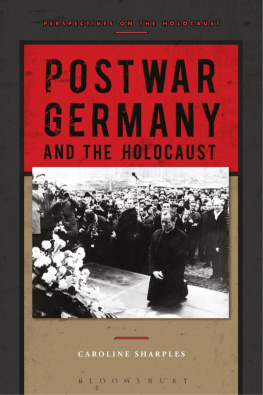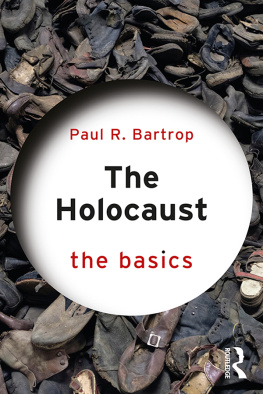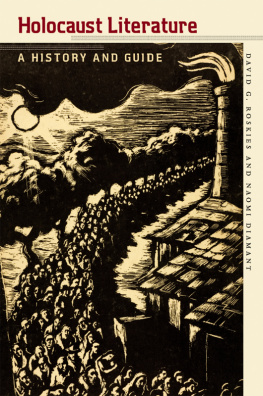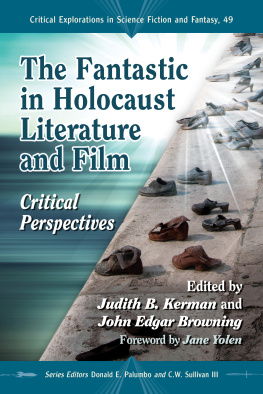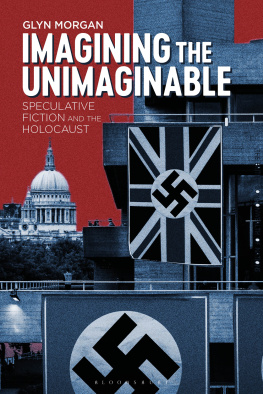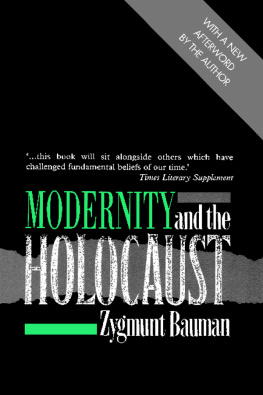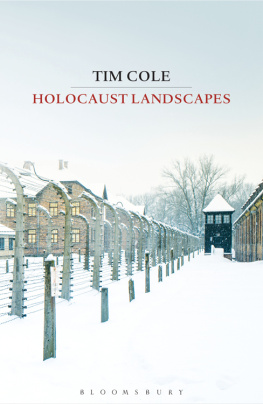Acknowledgements
Many thanks to Leonard Orr, Michael Rothberg, and two anonymous readers for insightful input into this project while it was at the proposal stage. For much-appreciated advice, guidance and encouragement, a huge thank you to Sue Vice, Adam Piette, Jonathan Ellis and Nicky Hallett at the University of Sheffield. Gratitude is also due to the staff of the British Library for assistance in locating and obtaining research materials, and to the editorial team at Bloomsbury, particularly David Avital and Mark Richardson, for all of the assistance provided during the process of completing this volume. Much gratitude is also due to the contributors for showing such patience and good humour during the editing process.
The editor and contributors are grateful for permission to reproduce the following:
Sherman Alexie, The Game between the Jews and the Indians Is Tied Going into the Bottom of the Ninth Inning and Inside Dachau, reprinted from First Indian on the Moon (1993) and The Summer of Black Widows (1996) by Sherman Alexie, by permission of Hanging Loose Press.
Dan Pagis, Written in Pencil in the Sealed Railway-Car, reprinted from The Selected Poetry of Dan Pagis ([1989] 1996), by permission of the University of California Press.
Gerhard Richter, Uncle Rudi (1965), oil on canvas, Lidice Memorial, Czech Republic, reproduced by permission of Gerhard Richter.
W. G. Sebald, image from W. G. Sebald, Vertigo (1990), reproduced by permission of the estate of W. G. Sebald.
Notes on Contributors
VictoriaAarons holds the position of OR and Eva Mitchell Distinguished Professor of Literature and Chair of the English Department at Trinity University. She is the author of A Measure of Memory: Storytelling and Identity in American Jewish Fiction and What Happened to Abraham: Reinventing the Covenant in American Jewish Fiction, recipients of the CHOICE Award for Outstanding Academic Book, and the forthcoming anthology The New Diaspora: The Changing Landscape of American Jewish Fiction. She has published over 70 articles and book chapters and serves on the editorial boards of a number of journals. She is currently completing a book manuscript on post-Holocaust writing, Third-Generation Holocaust Representation: Trauma, History, and Memory.
JenniAdams is the author of Magic Realism in Holocaust Literature: Troping the Traumatic Real (2011) and the co-editor, with Sue Vice, of Representing Perpetrators in Holocaust Literature and Film (2013). She has published articles and essays on writers including Jonathan Safran Foer, Anne Michaels, Bruno Schulz, Jonathan Littell and Yann Martel, with the overriding preoccupation in her work being the relationship between ethics and aesthetics in Holocaust fiction.
MichaelBernard-Donals is the Director of the Mosse/Weinstein Center for Jewish Studies and the Nancy Hoefs Professor of English at the University of Wisconsin-Madison. He is the author of several books, including Between Witness and Testimony: The Holocaust and the Limits of Representation (2001), An Introduction to Holocaust Studies: History, Memory, and Representation (2006) and Forgetful Memory: Jewish Remembrance after Auschwitz (2009). He is currently at work on two projects: an introduction to Jewish rhetoric (with Janice Fernheimer) and a book on the rhetorical shape of memory at the United States Holocaust Memorial Museum.
MatthewBoswell is a Research Fellow in the School of English at the University of Leeds. Since completing his Ph.D. on Holocaust poetry at the University of Sheffield, his research has focused on Holocaust fiction, taboo forms of Holocaust representation and hybrid testimony. His monograph, Holocaust Impiety in Literature, Popular Music and Film (Palgrave Macmillan, 2012), considers irreverent and controversial representations of the Holocaust by non-victims. He is currently working with partners in South Africa and Australia on a range of projects relating to transnational memories of the Holocaust.
StefCraps teaches English at Ghent University, Belgium, where he also directs the Centre for Literature and Trauma. He is the author of Postcolonial Witnessing: Trauma Out of Bounds (Palgrave Macmillan, 2013) and Trauma and Ethics in the Novels of Graham Swift: No Short-Cuts to Salvation (Sussex Academic Press, 2005), and has guest-edited special issues of Criticism: A Quarterly for Literature and the Arts (2011; with Michael Rothberg) and Studies in the Novel (2008; with Gert Buelens) on the topics of, respectively, transcultural negotiations of Holocaust memory and postcolonial trauma novels.
RichardCrownshaw is Senior Lecturer in the Department of English and Comparative Literature, Goldsmiths, University of London. He is the author of The Afterlife of Holocaust Memory in Contemporary Literature and Culture (Palgrave Macmillan, 2010), co-editor, with Jane Kilby and Antony Rowland, of The Future of Memory (Berghahn, 2010, in paperback 2013), and editor of a special issue of the journal parallax on the topic of transcultural memory (2011). He is currently writing a monograph on memory, contemporary fiction and environmental catastrophe.
FernandoHerrero-Matoses received his Bachelors degree in Spanish Literature and Critical Theory at the University of Valencia, then studied at the Independent Studies Program (PEI) at the Contemporary Museum of Art in Barcelona (MACBA). He received his MA and Ph.D. from the University of Illinois, Urbana-Champaign, where he studied in the Department of Art History. His research examines Spanish contemporary art, and the intersections between art, literature and memory.
Brett AshleyKaplan received her Ph.D. from the Rhetoric Department at the University of California, Berkeley and is now Professor and Conrad Humanities Scholar in the Program in Comparative and World Literature and the Program in Jewish Culture and Society at the University of Illinois, Urbana-Champaign. Her books, Unwanted Beauty: Aesthetic Pleasure in Holocaust Representation (2007) and Landscapes of Holocaust Postmemory (2011), examine the Shoahs intersections with art and space. Her current projects are Jewish Anxiety and the Novels of Philip Roth (forthcoming) and



